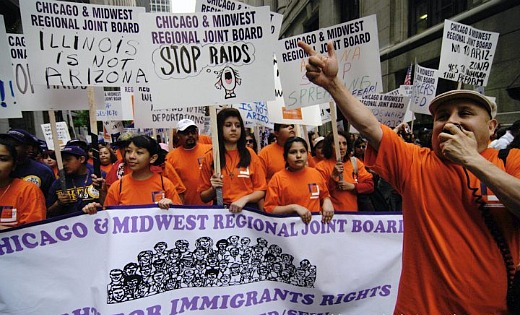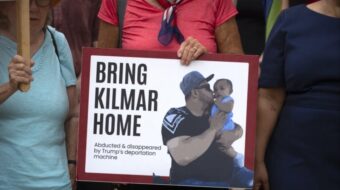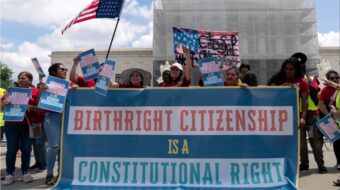
CHICAGO – The U.S. Department of Homeland Security and its Immigration and Customs Enforcement, or ICE, plans to promote a lighter image here through a new “community outreach program,” but immigrant and community activists are not convinced.
Immigration officials say the program will be unveiled during a kickoff event at the University of Illinois at Chicago April 11. The program’s motto, which some argue can be taken literally is, “Taking it to the streets.”
Officials hope to combat the negative impact of their policies when it comes to community mistrust, stereotypes and misinformation. The plan aims to bring immigration officials together with the immigrant and Muslim communities and encourage partnerships and resources. Officials say they want people to know they’re more than just border patrol and enforcement. The pilot program is expected to be a template for similar outreach nationwide.
However, the plan has drawn fierce criticism from some, most notably the Illinois Coalition for Immigration and Refugee Rights, the state’s largest immigrant rights advocacy group. The group blasted the program and said in a statement that it’s a “desperate response by a rouge agency that is destroying thousands of families a week to fix its image among immigrants.” The statement adds the plan amounts to nothing more than “trying to put lipstick on a very ugly pig.”
Furthermore, the coalition said, “We urge the Department of Homeland Security to improve its relations with immigrant communities by obeying the wishes of President Obama and focusing its efforts on deporting immigrants who are an actual danger to our communities, rather than grandmothers, parents, and spouses who are only here to contribute with their hard work.”
The local initiative by immigration officials comes at a time when activists are fighting ICE’s “Secure Communities” program, which is accused of overreaching into reluctant counties and using questionable tactics. The program was created to catch and deport dangerous criminals. But the immigrants’ rights group notes that 77 percent of all immigrants arrested through July of last year in the participating counties in Illinois had no past criminal convictions. ICE is also trying to expand a fingerprinting program across Illinois and nationwide that allows authorities to check the immigration status of inmates.
Both Chicago and coterminous Cook County are considered sanctuary areas and do not participate in the Secure Communities program, yet many surrounding counties do.
Alheli Herrera is an organizer with Enlace Chicago, a non-profit community development group based in the predominantly Mexican American Little Village neighborhood, on the city’s southwest side.
She says she’s very skeptical about the new program.
Immigration officials are trying to soften their image by promoting citizenship workshops, job fairs and providing employment opportunities for community residents in the agency, says Herrera.
“But it seems to me that by doing this they are ignoring the reality that ICE continues to separate immigrant families almost on a daily basis,” she said. “So I take their efforts with a grain of salt, for now.”
In 2007, immigration officials armed with guns and riot gear led a daytime raid at a shopping center in Little Village, which residents and activists condemn.
Herrera notes the Secure Communities program instills fear in immigrant families that live in Little Village but have to travel through and work in suburbs that reside in counties outside Cook.
“The reality is they’re picking up people with no criminal background and placed in deportation proceedings,” said Herrera. “And officials are using this tactic as a vehicle to deport more and more innocent people.” Immigrant workers are being racially profiled and being pulled over in traffic stops with no real violations, she added.
Herrera, who works in Little Village, says immigrant families are hungry for information about their rights in case of an ICE home invasion or a workplace raid. Parents show up in large numbers to hear about resources they can use so their children can receive educational opportunities and college scholarships, she added. Immigrant families are really in need of a safety-net when it comes to their basic rights and needs.
The bottom line, says Herrera, is that if immigration officials really want to work with or help the immigrant community they need to recognize the real negative impact of their policies, which promote fear and racial profiling.
“Community outreach is a good step, but it’s also hypocritical, especially if they are trying to reach the very families they are hurting and separating every day,” she said.
Photo by Adrian Garcia/PW










